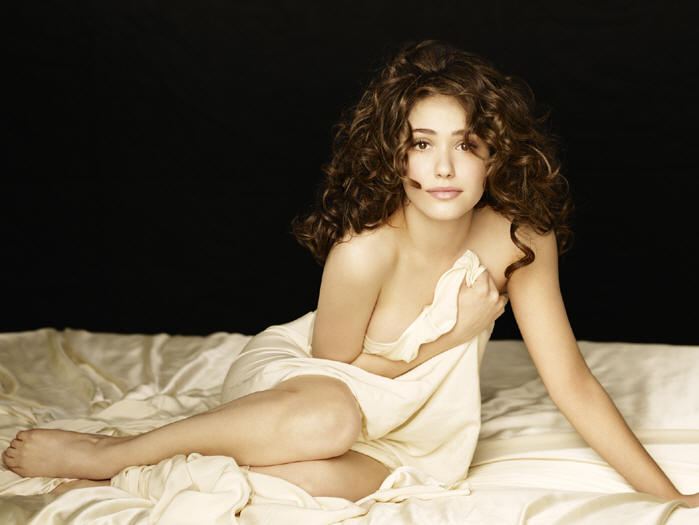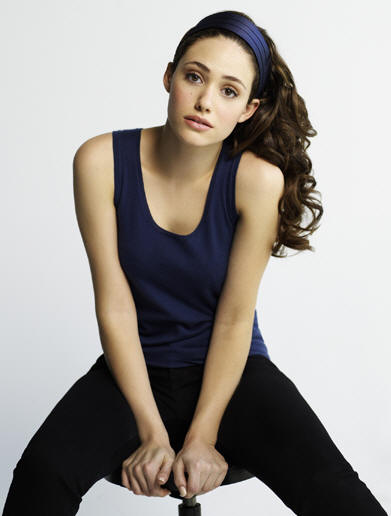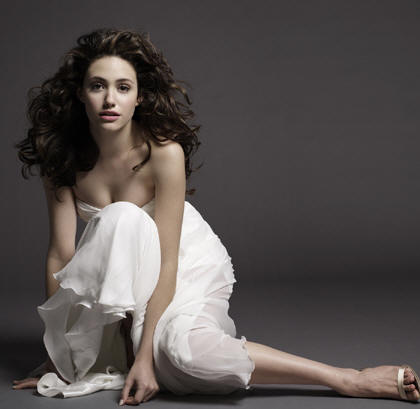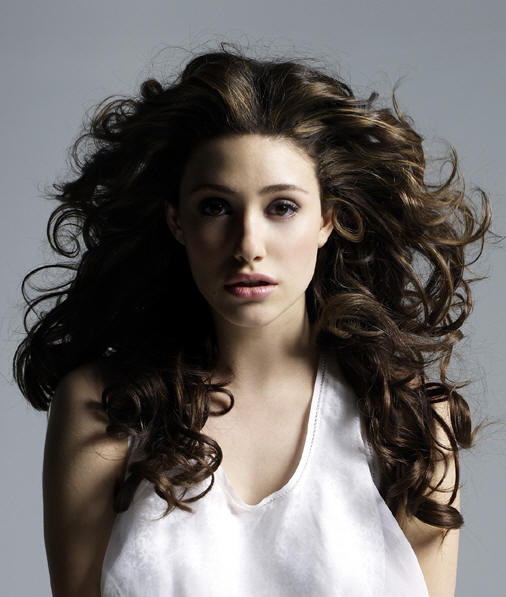Copyright ©2007 PopEntertainment.com. All rights reserved.
Posted:
August 22, 2007.
When you’ve spent most of your life working to make a name in one field, it
takes a certain leap of faith to put it on hold to try something different,
just when your career has taken off.
Emmy Rossum has taken that leap.
At
only twenty years old, Rossum has put together a diverse and interesting
body of work in film over the past seven years. Starting with a supporting
role in Songcatcher, she quickly graduated to playing lead roles in
the respected but little-seen films Passionada, Happy Now and
Nola. However, her career jumped to another level since she played the
hugely important supporting role of Sean Penn’s murdered daughter in the
acclaimed 2003 drama Mystic River. Since that film she has played
the female leads in The Day After Tomorrow, The Phantom of the Opera
and Poseidon.
It
was scary to put her film career on hold for a while to concentrate on her
music, but it was something she felt she had to do.
“I
took off for an entire year from film and threw myself into lyrics and music
and really tried to focus on it 150%,” Rossum says. “I
really think that’s the reason that it’s so developed and rich and layered
sounding. It’s because I could give it that much time and focus. It’s
interesting, because going and playing so many different characters for
years, you kind of lose a little bit of yourself. You’re so busy trying to
portray other people that you don’t really have time to develop as a
person. So, it was really nice for me to take this moment and just kind of
figure out who I am. At the same time… I’m always a little press shy and
this is the first time I feel like I have the safety of exposing myself and
being honest and bare emotionally in that way. It’s the safety of having it
be through music. It’s not just talking about it.”
Not
that it is a total surprise that Rossum would gravitate towards music. She
was a child prodigy, growing up on classical music and opera. She started
playing piano as a small child and singing at the world famous Metropolitan
Opera by seven.
 “I
was singing in the chorus in the second grade in my regular school,” Rossum
recalls. “My second grade chorus teacher pulled me aside one day and said,
‘You know, I’ve been listening to you in class and I think that you are
talented. I’d like to set up an audition for you at the Metropolitan
Opera. To go over there and sing for them, because sometimes they take a
select group of young people and take them into the chorus and train them
there.’ I knew that I loved singing, but no one in my family was musical at
all, so I was kind of surprised. She set up the appointment for me and I
went over and auditioned and they took me. That afternoon I was in
rehearsal. Then, it just all kind of spiraled from there.”
“I
was singing in the chorus in the second grade in my regular school,” Rossum
recalls. “My second grade chorus teacher pulled me aside one day and said,
‘You know, I’ve been listening to you in class and I think that you are
talented. I’d like to set up an audition for you at the Metropolitan
Opera. To go over there and sing for them, because sometimes they take a
select group of young people and take them into the chorus and train them
there.’ I knew that I loved singing, but no one in my family was musical at
all, so I was kind of surprised. She set up the appointment for me and I
went over and auditioned and they took me. That afternoon I was in
rehearsal. Then, it just all kind of spiraled from there.”
However, just because she was a prodigy and singing at the
Met through her childhood, don’t assume that she had a silver spoon in her
mouth. In fact, Rossum and her mother had to struggle every step of the way
to achieve everything
she was doing.
“People think I’m from a privileged background, because I
haven’t really talked much about my life,” Rossum acknowledges. “They’ve
only seen me in these big, glamorous movies and the big, glamorous red
carpet. They know that I went to this kind of tony private school. What
they don’t know is that I should have been a scholarship kid. I was raised
by a single mom who was working around the clock to put me in private
school. We were too proud to ask for a scholarship. I guess the reason I
love music so much is because when I found the opera – when my second grade
teacher sent me over there – I really felt like I found my place in the
world. I found a bunch of people that were interested in the same things
that I was and who loved music. I could throw myself in that and find a
family there. I think I was really lucky to find that so young. A lot of
people search their whole life to find something that they really love and
something they are good at. I found it when I was really young.”
She
was a little older when she found out about popular music.
However once Rossum did,
she was hooked.
“After I left the opera when I was twelve, when I got too
tall for the children’s costumes,” she chuckles, “I was exposed to so
different many kinds of music… I learned that there were such things as
guitars, which they didn’t have at the opera.”
 At
that point, Rossum was traveling a lot as she had started working on films.
Being exposed to a lot of different kinds of world music, whether it was
like Icelandic bands or European music or pop from all over the world,
Rossum became increasingly influenced by the radio and different styles and
genres. She got hooked on other kinds of music, devouring the catalogues of
artists such as Jem and Elliott Smith.
At
that point, Rossum was traveling a lot as she had started working on films.
Being exposed to a lot of different kinds of world music, whether it was
like Icelandic bands or European music or pop from all over the world,
Rossum became increasingly influenced by the radio and different styles and
genres. She got hooked on other kinds of music, devouring the catalogues of
artists such as Jem and Elliott Smith.
“[They all] influenced me and I think are still present in my
work,” Rossum says.
However, at that time her work was revolving around film. She was able to
sing in her first movie role in Songcatcher, even doing songs solo
and as duets with Dolly Parton on the film’s soundtrack album. Soon,
though, the acting roles were coming so fast that the music took a back
seat. Particularly once she snagged the role in Mystic River, which
was directed by Hollywood legend Clint Eastwood and starred Sean Penn, Tim
Robbins, Laura Linney, Marcia Gay Harden and Kevin Bacon.
“It
was thrilling,” Rossum recalls. “I auditioned for that. I sent Clint
Eastwood a tape of me reading the character’s part on a little video
camera. I got cast off that. I didn’t meet anybody until I walked on the
set the first day. It was very surprising and exciting. The same day I got
that call that I got Mystic River, I got the part in The Day After
Tomorrow as well. I was flying back and forth between the two projects
and everything had just taken off. It was very exciting being a part of a
small film like Mystic River, which I really felt was such an
important cast and such an important learning experience for me. Also to be
part of something like Day After Tomorrow, which was, I felt, so
ecologically important... I always have tried to really take the jobs that I really
believed in and never tried to do something I didn’t really want to do.”
Rossum did get to indulge her musical talents again when she was cast in the
role of Christine in the big screen adaptation of Andrew Lloyd-Webber’s
The Phantom of the Opera. Even more than in her earlier experience in
Songcatcher, her total immersion in music and singing ability was
vital. Again Rossum also spent a good amount of time working on the film
soundtrack. Rossum acknowledges that making these
movies provided
her with some of the best
times
she has ever had on film.
“It
was the most exciting thing ever,” she says. “I am most proud of those two
films because I got to do everything that I love the most. If I can combine
those in any way in the future, I’d love to as well.”
After Rossum made the film Poseidon with Kurt Russell and Josh Lucas,
she knew it was time to finally seriously try to harness the music that was
bursting to get out of her. She decided to take some time off of her acting
career to work on her debut CD. Still, as much as she loves music, she does
not expect to abandon her film career.
 “I
hope that I can do both,” Rossum says. “I enjoy both tremendously. I love
doing films. I love connecting with people in that way and I love telling
stories. I also love live performance and I love this music and I want to
share it with as many people as possible. I’d love to tour. I think the
music is unique and I’d like to share it with people. It’s got this rich,
layered sound that is sometimes 150 of my vocals on top of each other. It
creates this kind of sound that is very warming and very, very beautiful and
I hope that I can share that live with people. I came from live theater and
there is really nothing more exciting that to be able to connect with people
on a one to one level. You can’t reach through the movie screen and touch
them. It’s easier to do that live.”
“I
hope that I can do both,” Rossum says. “I enjoy both tremendously. I love
doing films. I love connecting with people in that way and I love telling
stories. I also love live performance and I love this music and I want to
share it with as many people as possible. I’d love to tour. I think the
music is unique and I’d like to share it with people. It’s got this rich,
layered sound that is sometimes 150 of my vocals on top of each other. It
creates this kind of sound that is very warming and very, very beautiful and
I hope that I can share that live with people. I came from live theater and
there is really nothing more exciting that to be able to connect with people
on a one to one level. You can’t reach through the movie screen and touch
them. It’s easier to do that live.”
While she is finishing her debut disk, the first fruits of Rossum’s time off
the set were released in August of 2007, in a somewhat novel way. A
three-song EP called Inside Out was released exclusively through the
iTunes download service. As an additional bonus, the songs are bundled with
a 19 minute documentary about the making of the album. It was an immediate
success, debuting as the fourteenth most downloaded title on the site. The full
length CD – including the three songs pre-released on iTunes – is expected
to hit stores hot on the EP’s heels in the fall.
“They are going to
be part of [the album],” Rossum says. “This is kind of like a little teaser
trailer.”
It
is an interesting tease. The three songs – “Slow Me Down,” “Stay” and
“Falling” in some ways bring to mind such diverse artists as Imogen Heap,
Enya and Kate Bush – and yet they are not derivative. Rossum is offering a
unique artistic statement.
While it is definitely accessible music – particularly “Falling,” which
actually could be an out-of-left-field dance club hit – you also do capture
glimpses of her classical background. Rossum says that
it is just one more color from her musical palette from which she can
draw.
“In
terms of finding the right harmonies and just finding different ways to
sing,” she acknowledges, “different tones of your voice to kind of round out
the richness of the sound. I think absolutely my classical training does
help. But, pop music is much more about connecting to people emotionally.
It’s not really about technique as much. You don’t really have to think
about that quite as much.”
One thing that is really striking about Rossum’s music is how
the vocals are layered, often in rather unexpected ways. Her vocals swoop
in and out over each other, dozens abetting and contrasting with each other
and giving the music an ethereal airiness. This was all part of the plan.
Rossum was very involved in the arrangements of the songs.
 “We
would sit by the piano, me and the producer [and co-writer Stuart Brawley]
sometimes for days trying to figure out which harmonies were perfect and
which were just close together and rubby enough and which were not,” Rossum
says. “There is a certain amount of dissonance that is beautiful, and then
there’s just too much.” She laughs. “So, it was a lot of layers and a lot
of trying things and experimenting. The whole process was so organic and so
fun that it was really very fulfilling, I think, to everyone involved.”
“We
would sit by the piano, me and the producer [and co-writer Stuart Brawley]
sometimes for days trying to figure out which harmonies were perfect and
which were just close together and rubby enough and which were not,” Rossum
says. “There is a certain amount of dissonance that is beautiful, and then
there’s just too much.” She laughs. “So, it was a lot of layers and a lot
of trying things and experimenting. The whole process was so organic and so
fun that it was really very fulfilling, I think, to everyone involved.”
She does recognize that all of this studio work could make
performing them live an interesting challenge – but it is a challenge that
she looks forward to facing.
“In terms of live, I think there are a lot of things you can
do,” she says. “I actually recorded my own voice and backing vocals onto a
piano so I can play my own voice when I can sing live. Or, I was thinking
of doing some kind of video installation where I photograph myself singing
every other different part. It’s very important that people know that I
sang all the parts. That wasn’t just background singers. Then I also think
the songs are really strong enough that they can be done piano-vocal. So I
think that you can really pare down or I think you can do more towards what
it sounds like on the record. Obviously I can’t sing 150 of me at once,”
she chuckles.
The three songs on
Inside Out, while
different in many ways, do have a similar theme lyrically – trying to find
the bravery and trust to open oneself up to love.